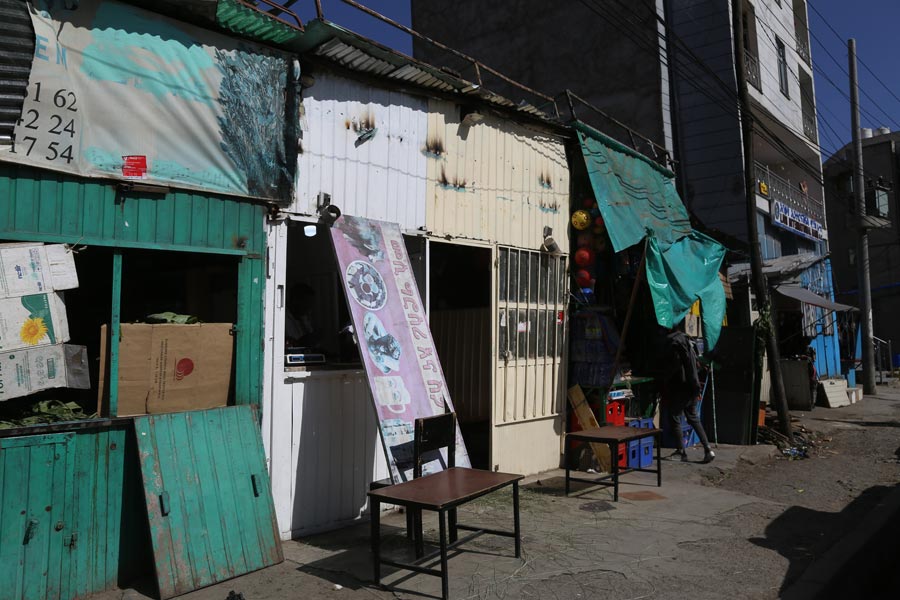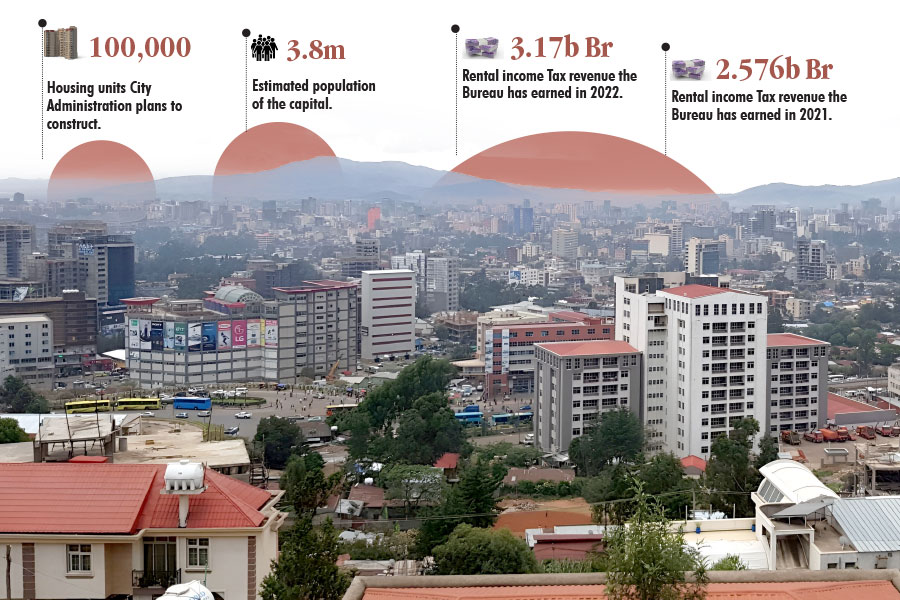
Life Matters | Dec 02,2023
It barely resembles a conventional bank that clients in Ethiopia are accustomed to. The place is as plush as a hotel lobby, framed by large windows and adorned with luminous lights casting white and yellow on the high walls and ceilings. The furniture is no less eye-catching, inviting visitors to delight themselves with comfort. A huge screen display on the wall flashes information about the Birr’s exchange rate of the day against more than a dozen foreign currencies.
There were no teller windows around either. The interior is designed to optimise close-up interactions with staff.
Welcome to Amhara Bank S.C., the new entrant into the banking industry. Its glowing branch in the Arat Kilo area represents the fourth generation of banks.
A client who seemed familiar with the environment walked over to the front desk: assuredly. It was Surafel Simachew’s second visit to the branch. He had paid a visit the days after Amhara Bank launched last month to open a savings account. Last week, however, he was there trying his luck with access to foreign currency.
Like so many others, Surafel has been desperate to get foreign currency for the past couple of years. He wants to bolster a web design and software development business he runs. Repeated attempts at securing forex from commercial banks have proved futile.
“I came thinking a big bank can accommodate my needs,” he told Fortune.
His assumption is based on the sheer scale of Amhara Bank. It began operations with nearly six billion Birr in equity raised from over 165,000 shareholders. No private bank has ever mobilised this much capital from such numbers of people. The Amhara Bank has earned the title of “the people’s bank.”
Headquartered in the La Gare area, Addis Abeba’s financial district, the new heavyweight contender made its industry debut with 72 branches scattered across the capital and beyond.
Melaku Fenta, the board’s chairperson, played a pivotal role in its formation. He is a household name among the business community, having served as chief of the former Ethiopian Revenues & Customs Authority for seven years. He was credited with reforming Ethiopia’s tax regime, boosting the tax-to-GDP ratio to 12.7pc, a share that dropped in recent years and down by half last year. He was jailed for five years on corruption charges and released in 2018 after federal prosecutors dropped all charges against him.
Melaku’s experience and connections could have helped him persuade tens of thousands of shareholders to form one of the country’s largest private commercial banks. Size matters in an economy like Ethiopia’s, where digital banking is nascent. It is effective in attracting not only clients like Surafel. It also lures talent and experienced staff.
Bekele Shemi, 32, joined Amhara Bank last month as a customer service officer. He is an experienced hand in the industry, having held similar positions in Dashen and Bunna banks. Bekele is excited about the opportunities before him to climb the corporate ladder at Amhara Bank.
“I’ve got the prospect to rise through the ranks faster,” he told Fortune.
Next to him sat Abebe Sewinet, who had a different reason for joining the Bank. Abebe is not new to banking. But he was lured in by higher pay and benefits packages working as a customer service executive. Amhara Bank offered him over a third higher than the 11,000 Br, a monthly gross salary he had earned with his former job at Lion International Bank.
Ahadu Bank began operations last week as the industry's 20th private commercial bank. The number is set to grow in the coming months, as more than half a dozen banks have acquired permits from regulators.
“Offering competitive salaries and benefits is a must,” said Aschalew Tamiru, director of marketing and branding for Amhara Bank.
Amhara Bank expanded its branch network to over 100 less than a month after its launch. But, the rapid growth brings demand for an experienced and skilled workforce. The Bank’s human resource intake has glided past 200 in a few weeks.
The past year has seen a flood of new entrants and industry hopefuls queuing for a stake in the thriving financial sector. Even after the central bank raised the minimum capital threshold to five billion Birr, five banks – ZamZam, Hijra, Goh Betoch, Sinqeee and Amhara – have made their debuts. Half a dozen more, including Ahadu, Tsehay, Rammis, and Sidama, are on the verge of starting operations after obtaining regulators’ permits.
The spur has pushed the number of private banks in business to 20, up from 16 two years ago. The expansion presents opportunities for a country with low financial penetration. A challenge for the industry is the scramble for a skilled workforce.
“It’s not unusual for new banks to hire from existing banks,” said Mekiya Dino, director of human resources at ZamZam.
Since it opened for business last year, ZamZam Bank has expanded its operations to 40 branches manned by 450 employees.
The mass arrival of new entrants has led to a predicament where industry veterans struggle to retain staff. The executives of older banks concede that the arrival of new players puts pressure on what is already a precarious labour market. The scramble for talent, experience and skill was present even before the arrival of the “fourth generation” banks. Private banks were on edge due to their aggressive branch expansion approach, which has grown more fierce over the past six years.
“Our strategy focuses on staff training and recruiting fresh graduates,” said Melaku Kebede, president of Hibret Bank, a first-generation private bank.
Hibret trains an average of 200 university graduates each year.
“When we lose employees, we fill the vacant positions with fresh graduates we recruit and train,” Melaku told Fortune.
Nonetheless, the initiative does not mean Hibret is entirely free hiring from others in the industry.
“We also hire from other banks for positions that require experience,” said the President.
This practice has forced Hibret to adjust its salary scale regularly. Last year, its executives raised their employees’ salaries by an average of 35pc. They plan to do the same next year.
An industry starved of a skilled workforce led to aggressive poaching, offering pays above the average labour cost and benefits packages no other industry dares to try. Banks raise salaries regularly to poach skilled employees from other banks and retain their own. This is, however, putting a strain on their resources.
Seven years ago, banks offered an average of 3,000 Br for entry-level employees, while the most senior executives could hope for no more than 42,000 Br a month. The latter could earn up to 150,000 Br now.
The 27-year-old Awash Bank hired over 2,000 new employees last year, pushing its workforce to more than 12,000. The hiring spree was a factor in the 35pc increase in expenses the Bank incurred. Wages and benefits grew by 1.3 billion Br from 2.2 billion Br, comprising nearly 40pc of total expenditures. Compare this to interest expenses, a core of banking, which went up by 24.5pc to 3.3 billion Br, accounted for 37.1pc.
Dashen Bank, the second-oldest private bank, recruited 1,200 employees last year, pushing its workforce to 7,200. Its staff and administrative expenses soared by 23pc in a year, to 560 million Br. Its expansion is unlikely to slow down any time soon.
Its President, Asfaw Alemu, says his bank opens branches not to simply “announce our presence.”
“Opening branches is useful if it helps to reach the unbanked segment of society,” he told Fortune.
The lowest branch network is operated by Enat Bank, a third-generation bank which opened 39 branches over the past five years. It runs over 100 branches, operated by 1,100 permanent staff. Last year, it saw its expenses for salaries and benefits grow by 42pc to 267 million Br. It recruited an additional 150 workers.
Ermias Andarge, the president, says expanding branches aggressively will not be a feasible option for banks soon.
“We’re moving towards digital banking,” he told Fortune.
Dashen’s Asfaw also sees digital banking as a way forward.
“Digital banking platforms relieve branch employees from tedious workloads,” he said.
Abdulmenan Mohammed, a financial analyst based in London, agrees with both presidents.
“With the use of technology and improved financial literacy, the expansion of branches can be limited,” he said.
Sewale Abate (PhD), lecturer of finance and investment at Addis Abeba University, differs.
“At this stage, digital banking is not an option to replace the role branches play,” he asserted.
The history of Zemen Bank serves as a living illustration of his argument. It started in the early 2010s with a single branch concept. Market realism brought the founders to the reckoning that Zemen Bank was not unsusceptible to the demand for wide branch networks. For almost a decade, the executives of Zemen Bank managed expenses related to wage and branch operating costs better than any other in the industry. But their invulnerability gave way later as the Bank dropped the single branch model in 2015. they opened 58 branches, making up less than three percent of the industry’s branch network.
Nonetheless, Zemen Bank’s staff and general administration expenses jumped by 36.4pc last year to 375 million Br.
The banking industry has seen a considerable expansion in branch networks since 2016. The 18 banks – including the state-owned Commercial Bank of Ethiopia (CBE) and Development Bank of Ethiopia (DBE) – operated under 2,900 branches in the mid-2010s. This has since grown to more than 8,000. The CBE dominates, opening over 700 branches over the past five years to push its network to 1,900. The Bank of Abyssinia, a first-generation bank, leads the private banks with 628 branches, over 450 of which were inaugurated in recent years. Awash International Bank, the oldest private bank, follows with 524 branches.
The rapid growth has led the branch-to-population ratio to improve by a third from one branch to 18,000 citizens. Still, two-thirds of the Ethiopian population remains unbanked, according to a study conducted by the World Bank in 2019.
Banks have reasonable grounds to believe that profitability and size correlate. The ballooning branch networks allowed them to realise the economy of scale, doubling deposit mobilisation to 1.3 trillion Br. The industry remains focused on deposit mobilisation, and recent entrants have their eyes fixed on beefing up deposits.
Sewale observes opening branches has valuable advantages.
“It allows for better personal interactions with their clients,” he said.
Other experts argue that efficient expense management is among the most significant factors executives of financial institutions should be aware of.
“Increasing size allows banks to spread fixed costs over a greater asset base, thereby reducing their average costs,” said Abdulmenan.
Yet, branch network expansion is becoming onerous and expensive due to the limited availability of well-trained and experienced professionals in finance. It has fueled high employee turnover in the industry while simultaneously pushing the amount banks spend to retain staff and on fresh recruitments. Over the past five years, the number of people joining the industry rose by an annual average of 16pc. The banking industry had employed nearly 140,000 people by the end of last year, making it the largest employer next to the state.
Although this puts the banking industry as a frontrunner among those with the largest workforce, the rise in the number of workers does not correspond with the aggressive branch expansion programmes. The challenge is more pronounced for smaller commercial banks with limited financial resources. The executives of ZamZam Bank plan to open an additional 50 branches shortly, which are likely to be staffed with employees from other banks.
Though the dilemma between a skilled workforce and growing expenses may be a headache for their executives and colleagues in other banks, employees lower down the corporate ladder like Bekele and Abebe stand to benefit.
PUBLISHED ON
Jul 17,2022 [ VOL
23 , NO
1159]

Life Matters | Dec 02,2023

Agenda | Nov 25,2023

View From Arada | Nov 11,2023

Fortune News | Nov 20,2023

Fortune News | Jul 17,2022

Radar | Sep 05,2022

Commentaries | Jul 13,2025

Obituary | Oct 20,2024

Commentaries | Oct 26,2024

Fortune News | Apr 03,2023

Dec 22 , 2024 . By TIZITA SHEWAFERAW
Charged with transforming colossal state-owned enterprises into modern and competitiv...

Aug 18 , 2024 . By AKSAH ITALO
Although predictable Yonas Zerihun's job in the ride-hailing service is not immune to...

Jul 28 , 2024 . By TIZITA SHEWAFERAW
Unhabitual, perhaps too many, Samuel Gebreyohannes, 38, used to occasionally enjoy a couple of beers at breakfast. However, he recently swit...

Jul 13 , 2024 . By AKSAH ITALO
Investors who rely on tractors, trucks, and field vehicles for commuting, transporting commodities, and f...

Oct 18 , 2025
The political establishment, notably the ruling party and its top brass, has become p...

Oct 11 , 2025
Ladislas Farago, a roving Associated Press (AP) correspondent, arrived in Ethiopia in...

Oct 4 , 2025
Eyob Tekalegn (PhD) had been in the Governor's chair for only weeks when, on Septembe...

Sep 27 , 2025
Four years into an experiment with “shock therapy” in education, the national moo...